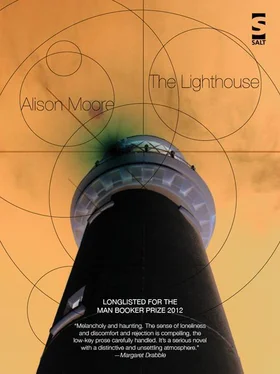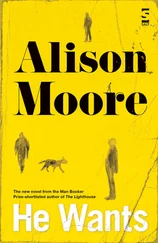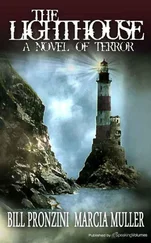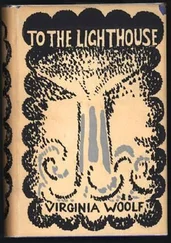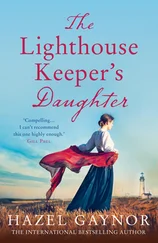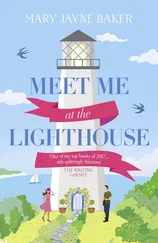Futh did not see Kenny again until Christmas. They met at the butcher’s. Gloria, coming into the shop and standing in line behind Futh and his mother, said hello. Kenny had already gone to wait outside and Futh joined him. Futh asked Kenny why he had left, and Kenny looked at him as if he were stupid and said, ‘I went with my dad.’
‘But why did your dad leave?’ asked Futh.
‘Well, he couldn’t stay,’ said Kenny, ‘knowing about the affair, could he?’
When primary school ended and Futh’s mother left and Futh began to spend his free time sitting on his climbing frame in the dark, he found himself thinking about Kenny, whom he had not seen in the two years since their meeting at the butcher’s. He looked at Kenny’s empty bedroom window, underneath which Gloria ate her supper alone in the kitchen.
She never seemed to have friends over, female friends like his mother had, who used to gather in the living room or on the patio in good weather, and sometimes his mother played a favourite song, her favourite singer, and started dancing, while he played by himself nearby, told to stay out of the way, getting as close as he dared, mesmerised by the noise and the perfume and the minidressed legs of his mother’s friends. Gloria had not been one of them.
He got to know Gloria’s habits. When she came into the kitchen to prepare her evening meal, she would turn on the radio. She would open the back door to call in the cat and feed it titbits from her plate while she was eating. When she finished, she would clear up and then, leaving the radio on, she would go upstairs to take a shower or a bath, and he would see her, the vague pinkness of her, fragmented by the bathroom window’s bobbled glass. She would come back down in her nightie, sit at the kitchen table and have a drink or two. She would feed the cat again, maybe take out the rubbish, or, in that summer of drought, soak her garden with the hosepipe in the dark. Alone in a street full of parched and pale lawns, while neighbours’ plants wilted and died, Gloria’s garden was lush.
The back door opened and Gloria appeared on her doorstep with a rubbish bag, but instead of going to the bins she walked onto the lawn, coming his way in her nightie, bringing the rubbish bag with her.
Leaning against the fence, she said, ‘All on your lonesome?’
Not knowing what to say, Futh said nothing.
‘Me too,’ she said, twirling the rubbish bag in her hand. ‘I could do with some company.’
‘I’ve got to go in soon,’ said Futh.
Gloria looked over Futh’s shoulder at the house, at the lit kitchen window. ‘What you and your daddy need now,’ she said, ‘is a nice holiday. That’s what I did when my husband left me. I went off on holiday. After a fortnight of sunshine and cocktails, I wasn’t even thinking about him.’
Futh, hearing his father calling him, turned around and was beckoned inside. When Futh turned back, Gloria was already walking away with her rubbish bag.
‘What did she want?’ asked his father, as Futh stepped into the kitchen.
‘She just came over to talk to me,’ said Futh.
‘What did she say?’
‘She said she was lonely.’
‘I don’t want you talking to her,’ said his father.
There were bowls of oxtail soup on the table. They sat down and ate, and Futh, through the curtainless window and across the dark back gardens, saw Gloria’s kitchen light and all her downstairs lights go off. A minute later, he saw her bathroom light go on again.
There was a curtain rail there, above the kitchen window. When they moved into this house, when Futh was seven, his mother had measured up for curtains, but she never got round to making them before she left. She had planned to paint the house from top to bottom, but had only done the landing when she stopped and did no more. Most of the pictures she brought from the old house were never hung, and the flowerbeds were planted but then grew wild.
His father, polishing off his oxtail soup, standing and reaching for his slip-on shoes, said, ‘I’m going out. Finish up, it’s your bedtime.’ When he opened the kitchen door, the cold night air came in and stayed when he was gone.
Gloria’s bathroom light went off and Futh saw Gloria coming into her bedroom. He shovelled his soup, chasing the last bits of meat around the bottom of the bowl. He saw her in front of her dressing table mirror, checking the look of herself in her nightie, touching her hair. She went back out onto the landing. A moment later, the light in the downstairs hallway went on, and when it went off again Futh stood quickly, put his empty soup bowl in the sink and went to bed.
He wakes in darkness. He can’t see a thing and doesn’t know where he is.
‘Where am I?’ he asks, before grasping that he is alone. He thinks he must be in the spare room, but everything feels wrong. Then he thinks he might be in his second-hand bed at the new flat but that does not seem right either. Finally he realises that he is on the ferry. He is on holiday, he thinks, that’s all, he is going on holiday, and he goes back to sleep.
He and his father had a daytime crossing to Europe. As well as taking him to the cinema and letting him have popcorn, his father bought him sweets in a mug from the duty-free shop and too many packets of peanuts at the bar and Futh felt sick in the car all the way from the ferry to their hotel in Germany.
Their hotel room had two single beds and a small bathroom. At bedtime, when Futh wanted a night light, his father put the bathroom light on and left the door ajar, and then said, ‘Go to sleep now.’ But Futh lay awake, turned towards that crack of light, watching in the big mirror behind the sink as his father changed his shirt and combed his hair and brushed his teeth and then — Futh quickly closing his eyes and trying to breathe like someone sleeping — he left, the door clicking shut behind him.
In the morning, his father would be there, in the other single bed, dozing with his mouth open, the odour of alcohol seeping out. When Futh got out of bed to go to the bathroom, his father would stir, asking, with eyes narrowed against the daylight, what time it was. Futh would tell him, and his father would be surprised by how late it was. He would say to Futh, ‘You slept well.’ And Futh would say nothing about when, disturbed in the early hours, he saw the bedroom door opening, the light coming in from the corridor, his father returning with a woman, a different woman every night. When the door shut behind them, his father and these women felt their way through the bedroom still dimly lit by the light from the bathroom into which his father took them, the bathroom light briefly flooding the bedroom before the door was again closed leaving only the narrow gap through which Futh watched them in the mirror. And Futh, who had not slept well, stood in the bathroom in the morning, not wanting to touch the sink area, not wanting to look in the mirror.
He said nothing to his father about having woken up to find himself wetting the bed. He pulled his blanket over the wet sheets and got ready to go out, knowing that it would all be made clean in his absence.
Futh opens his eyes in the dark and hears a woman speaking to him loudly in a language he does not understand. He squints in the direction of his travel clock, trying to make sense of the position of the luminous hands. He can’t see the underside of the bunk right above him, and he reaches out and touches it to reassure himself that he is where he thinks he is. Then, feeling for the switch on the wall, he turns on the light.
It is morning and the ferry is arriving into the Hook of Holland. Futh gets up.
In the shower, in an apple-scented lather, he thinks about Angela. He wonders what she did with her Friday night and what she is planning to do with her Saturday. They have spent most of their Friday evenings on the sofa watching television. Now, early on a Saturday morning, he imagines her barely home from a night out, or in bed asleep, or not asleep, with another man. It is more than fifteen years since he was with anyone else.
Читать дальше
